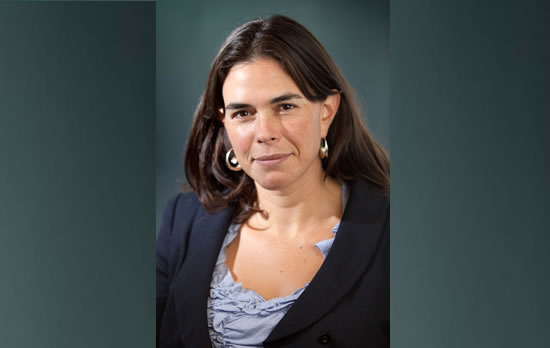Barnard President Speaks on Math & Anxiety
By Margaux Montagner

President Sian Leah Beilock, Barnard College
On November 21st, Barnard alumnae were invited to hear from the college’s 8th President, Sian Leah Beilock, about her background and her research on how to encourage enthusiasm for science and math for women and girls, and how people of all ages perform under pressure. Beilock was appointed in July 2017, succeeding Deborah L. Spar — now president of the Lincoln Center — after spending twelve years at the University of Chicago. As a cognitive scientist by training, a fellow of the American Association for the Advancement of Science and the American Psychological Association, and a member of the National Academy of Kinesiology, she published two books and hundred of articles. After reflecting on her first few months as president and thanking the alumnae for their generosity, she addressed a crowd of alumnae of all ages about an issue they know well: women, math and anxiety.
Beilock started by explaining what drew her to that subject: very early on, she was interested by the neuroscience of failure, or why we sometimes might not perform up to our potential because of anxiety about one particular subject, which led her to focus on women and girls’ anxiety about science, and particularly about math. She noted: “in our culture, it’s socially acceptable to brag about being bad at math, but you never hear anybody brag about being bad at reading!”. She questioned when these anxieties could be formed, since very young girls seemed to exhibit them, then how to help them get rid of such apprehensions and fulfill their potentials in math and science, as “we need, in our society, capable young women to pursue careers in those areas”.
After assessing that math related anxiety appeared as early as 1st grade, Beilock and her team devised a way to measure it: a scale with frowning and smiling faces that the children could use to describe their feelings. While they all started school with mostly neutral feelings about math, Beilock’s research found that by the end of the year, anxiety about the subject had appeared, and that girls were more affected by it than boys. It also showed that anxiety impacts performance: “when kids are anxious about doing math, they perform worse in math class”, said Beilock.
And as she wondered where it came from, she investigated which college majors had the most anxiety about math. It turned out to be Early Education, which is predominantly composed of female students, which led her to wonder if their anxiety was somehow contagious. “By the end of the school year, children in classes where teachers were more anxious about their math ability were more likely to perform poorly”, she revealed.
As a solution, she assessed that teachers have to be more supported in those matters, but also that parents should learn to talk to their children about math in a more positive manner, instead of showing distaste for it. Hence came the idea of “bedtime math, not just bedtime stories”. Her team worked with a non-profit organization to create the Bedtime Math application, which was then tested with over a thousand families. By creating fun and interesting ways to use math, and “infusing math into their homes”, it helped the most anxious parents feel more comfortable with the discipline, and thus helped children approach it in a more relaxed manner as well. #
